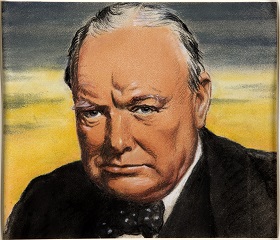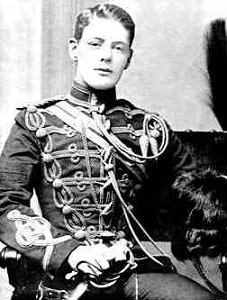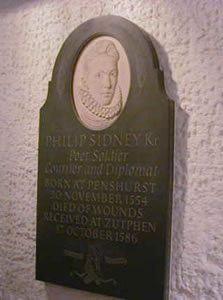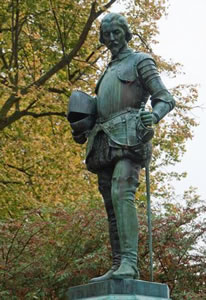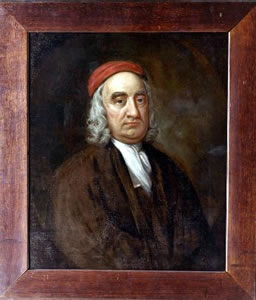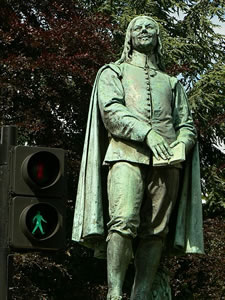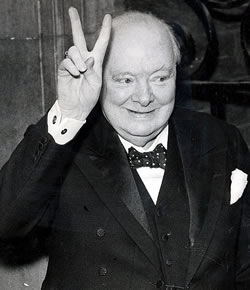De Nederlandse dichter en schrijver Jan G. Elburg werd geboren op 30 november 1919 te Wemeldinge. Zie ook mijn blog van 30 november 2006 en ook mijn blog van 30 november 2007 en ook mijn blog van 30 november 2008.
Aubade voor zedelijke normen
En het gaat voort. wij maken het hof aan een vliegveld.
vinden wij. goed goed goed praten zullen wij niet.
het is tijd voor een lief gebed: knieën uit de broek
gekipt en sneeuw bestellen om een oude vaderfabel
voor ongelovige ogen op te voeren.
was u neer? was u gepoot? was u verzekerd
tegen uw eigen gevoel van ongelijk? wat lijkt
u het beste van al die engelen met straalaandrijving?
boog u diep? was u deemoedig? wij maken het hof.
praten moet ik. goed goed. praten moet ik.
op zekere dag waren wij met onze zakken vol
van zekerheden. rookten zij onze woorden als sigaren.
stonden wij voor een muizenfluim besef.
woonden wij. ternauwernood. leidden wij
de dag in met lang opstaan, jankend om zeep
van vergetelheid. om de jeuk van ons voorhoofd
te wassen.
en het gaat voort. wij op trams voor de dromen
vluchtend, voor de ogen van onze scholingsboeken,
voor de verstelde vrouwen en dekens, voor de kolen,
voor het ontbijt, eer de kinderen ons aankijken,
wilden vervellen uit de waarheid, van schaamte
geschoren zijn met gave kaken. men moet leven kunnen
zonder lange tanden van alsem in de mond die praten
moet. stil, wij maken het hof aan een vliegveld.
Een ijver kenmerkt ons om het zaad van onze daden
chloorkalk te ofreren. op vrijersvoeten gaan wij onszelf
becijferen. of wij een verbazend bestaan beëindigen.
of wij zijn opgeleid. had u een moeder? had u te eten?
wij hadden een moeder uit angst voor ons willen.
en het gaat voort.
Heks Heks
Tover jij?
je leeft zo eenvoudig
als duizend anderen
binnen een tent van Frans katoen
met je borsten in twee kleine voorkamers
binnen een huisje van dunne kleren
zo klein zo klein
dat je benen de straat op moeten
je droomt zo bescheiden in je ogen
je werkt zo eenvoudig met je schouders
als duizend en een vrouwen
waarom moet mijn stem dan buigen
of een prinses voorbijkomt?
ik geef mij over
er komt een onmetelijke
vredige luchtvloot over
bekèn het maar je
(heks heks)
doet het, nietwaar, toveren.
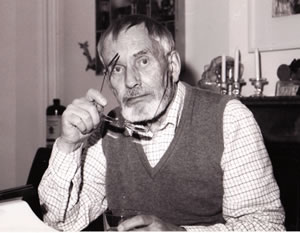
Jan G. Elburg (30 november 1919 – 13 augustus 1992)
De Amerikaanse schrijver Mark Twain (pseudoniem van Samuel Langhorne Clemens) werd geboren op 30 november 1835 te Florida. Zie ook mijn blog van 30 november 2006 en ook mijn blog van 30 november 2008.
Uit: The War Prayer
“It was a time of great and exalting excitement. The country was up in arms, the war was on, in every breast burned the holy fire of patriotism; the drums were beating, the bands playing, the toy pistols popping, the bunched firecrackers hissing and spluttering; on every hand and far down the receding and fading spread of roofs and balconies a fluttering wilderness of flags flashed in the sun; daily the young volunteers marched down the wide avenue gay and fine in their new uniforms, the proud fathers and mothers and sisters and sweethearts cheering them with voices choked with happy emotion as they swung by; nightly the packed mass meetings listened, panting, to patriot oratory which stirred the deepest deeps of their hearts, and which they interrupted at briefest intervals with cyclones of applause, the tears running down their cheeks the while; in the churches the pastors preached devotion to flag and country, and invoked the God of Battles beseeching His aid in our good cause in outpourings of fervid eloquence which moved every listener. It was indeed a glad and gracious time, and the half dozen rash spirits that ventured to disapprove of the war and cast a doubt upon its righteousness straightway got such a stern and angry warning that for their personal safety’s sake they quickly shrank out of sight and offended no more in that way.
Sunday morning came — next day the battalions would leave for the front; the church was filled; the volunteers were there, their young faces alight with martial dreams — visions of the stern advance, the gathering momentum, the rushing charge, the flashing sabers, the flight of the foe, the tumult, the enveloping smoke, the fierce pursuit, the surrender! Then home from the war, bronzed heroes, welcomed, adored, submerged in golden seas of glory! With the volunteers sat their dear ones, proud, happy, and envied by the neighbors and friends who had no sons and brothers to send forth to the field of honor, there to win for the flag, or, failing, die the noblest of noble dea
ths. The service proceeded; a war chapter from the Old Testament was read; the first prayer was said; it was followed by an organ burst that shook the building, and with one impulse the house rose, with glowing eyes and beating hearts, and poured out that tremendous invocation God the all-terrible! Thou who ordainest! Thunder thy clarion and lightning thy sword!”
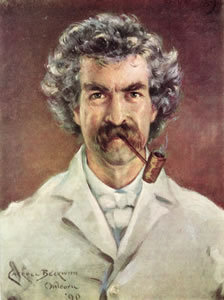
Mark Twain (30 november 1835 – 21 april 1910)
De Canadese dichter, schrijver, arts, kunstenaar en militair (Luitenant-kolonel) John Alexander McCrae werd geboren in Guelph (Ontario) op 30 november 1872. Hij heeft zich onderscheiden in de Boerenoorlog (1899-1902) waaraan hij als arts-vrijwilliger deelnam. In 1901 nam hij ontslag uit militaire dienst en wijdde zich aan een medische carrière tot op 4 augustus 1914 de Eerste Wereldoorlog uitbrak en hij zich opnieuw meldde als vrijwilliger. Hij werd benoemd tot arts bij de First Brigade van de Canadian Field Artillery. McCrae schreef met een zekere regelmaat gedichten waarvan ook een aantal in literaire bladen werd geplaatst. Op 22 april 1915 werden de eerste aanvallen met chloorgas ingezet te Boezinge, de plaats waar McCrae als arts frontdienst verrichtte tijdens de gevechten. Diep onder de indruk van de gebeurtenissen schreef hij op 3 mei het gedicht In Flanders Fields, misschien wel het meest bekende gedicht uit deze oorlog. McCrae is gestorven aan een longontsteking en hersenvliesontsteking, dienstdoend in een veldhospitaal. Hij is 45 jaar oud geworden.
In Flanders Fields
In Flanders fields the poppies blow
Between the crosses, row on row,
That mark our place; and in the sky
The larks, still bravely singing, fly
Scarce heard amid the guns below.
We are the Dead. Short days ago
We lived, felt dawn, saw sunset glow,
Loved and were loved, and now we lie,
In Flanders fields.
Take up our quarrel with the foe:
To you from failing hands we throw
The torch; be yours to hold it high.
If ye break faith with us who die
We shall not sleep, though poppies grow
In Flanders fields.
The Anxious Dead
O guns, fall silent till the dead men hear
Above their heads the legions pressing on:
(These fought their fight in time of bitter fear,
And died not knowing how the day had gone.)
O flashing muzzles, pause, and let them see
The coming dawn that streaks the sky afar;
Then let your mighty chorus witness be
To them, and Caesar, that we still make war.
Tell them, O guns, that we have heard their call,
That we have sworn, and will not turn aside,
That we will onward till we win or fall,
That we will keep the faith for which they died.
Bid them be patient, and some day, anon,
They shall feel earth enwrapt in silence deep;
Shall greet, in wonderment, the quiet dawn,
And in content may turn them to their sleep.

John McCrae (30 november 1872 – 28 januari 1918)
De Engelse schrijver Jonathan Swift werd op 30 november 1667 in Dublin geboren uit Engelse ouders. Zie ook mijn blog van 30 november 2006 en en ook mijn blog van 30 november 2008.
Uit: Gullivers Reizen (Vertaald door Sem Davids)
“Mijn naam is Lemuel Gulliver. In het jaar 1699 was ik scheepsdokter op een groot zeilschip, de Antilope. We voeren van Engeland naar Oost-Indië. Het was gezellig aan boord. Af en toe werd er iemand ziek en dan maakte ik hem weer beter. Maar grote rampen hadden we eigenlijk nog niet meegemaakt. Tot het op een dag, op 5 november 1699, vreselijk hard begon te stormen. Ons schip waaide heen en weer en we waren allemaal erg bang. De matrozen waren de hele tijd aan het jammeren, en de stuurman trok uit alle macht aan het stuur, om ervoor te zorgen dat het schip niet omsloeg. En ik?
Nou ja, het enige wat ik kon doen was mezelf goed vasthouden aan een grote paal. En die paal was mijn redding. Want een grote golf kwam, tilde het schip hoog op, en sloeg het in stukken uiteen op het woeste water. Ik voelde hoe ik in het koude water landde, en bleef mezelf vasthouden aan de paal. In de verte hoorde ik mijn naam schreeuwen: “Gulliver! Gulliver!” Maar al gauw hoorde ik niets meer.
Ik weet niet hoe lang ik in dat water heb gelegen. Maar uiteindelijk zag ik land. Met mijn laatste krachten zwom ik er naartoe. Uitgeput viel ik op het warme zand, en daar moet ik in slaap zijn gevallen.
Toen ik wakker werd, was ik helemaal stijf. Ik moest wel acht uur geslapen hebben. Ik wilde opstaan en mezelf eens lekker uitrekken… maar ik kon me niet bewegen! En toen voelde ik, dat ik met honderden kleine touwtjes vastgebonden zat! Om me heen hoorde ik allemaal stemmetjes. Toen voelde ik iets over mijn lichaam lopen. Met veel moeite tilde ik mijn hoofd op, en ik zag dat het een heel klein mannetje was. Het mannetje was niet groter dan mijn hand. Maar hij was niet alleen. Om mij heen en op mijn lichaam zag ik honderden kleine mensjes. Ze zagen er keurig gekleed uit en liepen opgewonden heen en weer. Ik hoorde heel vaak het woord “Lilliput, Lilliput!” dus ik denk dat ze daarmee bedoelden dat dit het eiland Lilliput was, en dat zij Lilliputters waren. Veel van die Lilliputters hadden een kleine pijl en boog, die ze op mij hadden gericht. Ik probeerde me los te rukken van de touwen, maar de kleine mensen schoten pijlen op me. Die pijlen waren vlijmscherp en deden gemeen zeer. Ik besloot maar rustig te blijven liggen om te zien wat ze van me wilden.
Een mannetje, dat heel deftige kleren aanhad, klom via mijn been omhoog en liep over mijn lichaam naar mijn borst. Daar bleef hij staan en hij begon tegen mij te praten. Maar de taal die hij sprak verstond ik niet. Toen hij uitgepraat was, liet ik met gebaren weten dat ik honger had. Dat begreep hij. Er kwamen ineens honderd Lilliputters aan, met kleine manden vol eten. Er was brood, maar dat was niet groter dan de nagel van mijn duim. En het vlees was niet groter dan de vleugel van een musje. Ik at wel drie stukken vlees tegelijk, en stopte vier broden tegelijk in mijn mond. De mensen keken vol verbazing toe. Toen liet ik merken dat ik graag wilde drinken. De kleine mensjes wisten al wel dat ze met een heel grote beker moesten komen, dus kwamen ze met een grote regenton. Voor mij was het niet groter dan een yoghurtbekertje, maar er waren drie Lilliputters voor nodig om hem te tillen.”
Jonathan Swift (30 november 1667 – 19 oktober 1745)
Portret van Swift in Marble Hill House, London
De Engelse schrijver Sir Philip Sidney werd geboren op 30 november 1554 in het kasteel van Penshurst in het graafschap Kent. Zie ook mijn blog van 30 november 2006 en ook mijn blog van 30 november 2008.
My True Love Hath My Heart, And I Have His
My true-love hath my heart, and I have his,
By just exchange, one for the other giv’n.
I hold his dear, and mine he cannot miss;
There never was a better bargain driv’n.
His heart in me keeps me and him in one,
My heart in him his thoughts and senses guides;
He loves my heart, for once it was his own;
I cherish his, because in me it bides.
His heart his wound received from my sight:
My heart was wounded with his wounded heart;
For as from me, on him his hurt did light,
So still me thought in me his hurt did smart:
Both equal hurt, in this change sought our bliss:
My true love hath my heart and I have his.
Some Lovers Speak
Some lovers speak when they their Muses entertain,
Of hopes begot by fear, of wot not what desires:
Of force of heav’nl
y beams, infusing hellish pain:
Of living deaths, dear wounds, fair storms, and freezing fires.
Some one his song in Jove, and Jove’s strange tales attires,
Broidered with bulls and swans, powdered with golden rain;
Another humbler wit to shepherd’s pipe retires,
Yet hiding royal blood full oft in rural vein.
To some a sweetest plaint a sweetest style affords,
While tears pour out his ink, and sighs breathe out his words:
His paper pale despair, and pain his pen doth move.
I can speak what I feel, and feel as much as they,
But think that all the map of my state I display,
When trembling voice brings forth that I do Stella love.
Sir Philip Sidney (30 november 1554 – 17 oktober 1586)
Naar een miniatuur van Sir Isaac Oliver
De Engelse dichter en schrijver John Bunyan werd geboren op 30 november 1628 in Harrowden bij Bedford. Zie ook mijn blog van 30 november 2006 en ook mijn blog van 30 november 2008.
Upon The Lord’s Prayer
Our Father which in heaven art,
Thy name be always hallowed;
Thy kingdom come, thy will be done;
Thy heavenly path be followed
By us on earth as ’tis with thee,
We humbly pray;
And let our bread us given be,
From day to day.
Forgive our debts as we forgive
Those that to us indebted are:
Into temptation lead us not,
But save us from the wicked snare.
The kingdom’s thine, the power too,
We thee adore;
The glory also shall be thine
For evermore.
John Bunyan (30 november 1628 – 31 augustus 1688)
Standbeeld in Bedford
De Duitse dichter en schrijver Rudolf Lavant (eig. Richard Cramer) werd geboren op 30 november 1844 in Leipzig. Zie ook mijn blog van 30 november 2008.
In der Vorstadt
(Nach dem Englischen des Francis W. L. Adams)
In finstrer Nacht, durch koterfüllte Gassen,
In dem Kanalgewirr und unter Bäumen
Der dumpfe Taktschritt ungesehner Massen,
Ein stöhnend Atmen wie aus wüsten Träumen!
Gespenstisch alles! Nur ein Lichtlein wacht –
Das ist der Vormarsch der Armee der Nacht!
Die Wunden all, die durch die Nacht Vertierten,
Die da in Höhlen und in Gruben wohnen,
Die Frau’n, die tränenlos ins Dunkel stierten,
Sie ziehen alle mit uns wie Dämonen.
Schließt eure Reihn! Welch blanker Schimmer lacht?
Die Bajonette der Armee der Nacht!
Mann, Weib und Kind, so kommen wir gezogen,
In erzner Säule, schweigend und gewaltsam.
Es drängen sich die Reihn wie Meereswogen,
Düster und feierlich und unaufhaltsam.
Der Dämm’rung zu, die leis im Ost entfacht,
Wälzt sich die drohende Armee der Nacht!
Rudolf Lavant (30 november 1844 – 6 december 1915)
De Britse staatsman en schrijver Sir Winston Leonard Spencer Churchill werd geboren in Woodstock op 30 november 1874. Zie ook mijn blog van 30 november 2007 en ook mijn blog van 30 november 2008.
Uit: Speech before Commons (June 4, 1940)
“We are assured that novel methods will be adopted, and when we see the originality, malice and ingenuity of aggression which our enemy displays we may certainly prepare ourselves for every kind of novel stratagem and every kind of brutal and treacherous manoeuvre. I think no idea is so outlandish that it should not be considered and viewed with a watchful, but at the same time steady, eye.
We must never forget the solid assurances of sea power and those which belong to air power if they can be locally exercised. I have myself full confidence that if all do their duty and if the best arrangements are made, as they are being made, we shall prove ourselves once again able to defend our island ho
me, ride out the storms of ware outlive the menace of tyranny, if necessary, for years, if necessary, alone.
At any rate, that is what we are going to try to do. that is the resolve of His Majesty’s Government, every man of them. that is the will of Parliament and the nation. The British Empire and the French Republic, linked together in their cause and their need, will defend to the death their native soils, aiding each other like good comrades to the utmost of their strength, even though a large tract of Europe and many old and famous States have fallen or may fall into the grip of the Gestapo and all the odious apparatus of Nazi rule.
We shall not flag nor fail. We shall go on to the end. We shall fight in France and on the seas and oceans; we shall fight with growing confidence and growing strength in the air. We shall defend our island whatever the cost may be; we shall fight on beaches, landing grounds, in fields, in streets and on the hills. We shall never surrender and even if, which I do not for the moment believe, this island or a large part of it were subjugated and starving, then our empire beyond the seas, armed and guarded by the British Fleet, will carry on the struggle until in God’s good time the New World with all its power and might, sets forth to the liberation and rescue of the Old. .”
Winston Churchill (30 november 1874 – 24 januari 1965)
De Canadese schrijfster Lucy Maud Montgomery werd geboren in Clifton op 30 november 1874. Zie ook mijn blog van 30 november 2008.
Uit: Anne Of Green Gables
“Mrs. Rachel Lynde lived just where the Avonlea main road dipped down into a little hollow, fringed with alders and ladies’ eardrops and traversed by a brook that had its source away back in the woods of the old Cuthbert place; it was reputed to be an intricate, headlong brook in its earlier course through those woods, with dark secrets of pool and cascade; but by the time it reached Lynde’s Hollow it was a quiet, well-conducted little stream, for not even a brook could run past Mrs. Rachel Lynde’s door without due regard for decency and decorum; it probably was conscious that Mrs. Rachel was sitting at her window, keeping a sharp eye on everything that passed, from brooks and children up, and that if she noticed anything odd or out of place she would never rest until she had ferreted out the whys and wherefores thereof.
There are plenty of people, in Avonlea and out of it, who can attend closely to their neighbors business by dint of neglecting their own; but Mrs. Rachel Lynde was one of those capable creatures who can manage their own concerns and those of other folks into the bargain. She was a notable housewife; her work was always done and well done; she “ran” the Sewing Circle, helped run the Sunday-school, and was the strongest prop of the, Church Aid Society and Foreign Missions Auxiliary. Yet with all this Mrs. Rachel found abundant time to sit for hours at her kitchen window, knitting “cotton warp” quilts–she had, knitted sixteen of them, as Avonlea housekeepers were wont to tell in awed voices-and keeping a sharp eye on the main road that crossed the hollow and wound up the steep red hill beyond. Since Avonlea occupied a little triangular peninsula jutting out into the Gulf of St. Lawrence, with water on two sides of it, anybody who went out of it or into it had to pass over that hill road and so run the unseen gauntlet of Mrs. Rachel’s all-seeing eye.”

Lucy Maud Montgomery (30 november 1874 – 24 april 1942)
